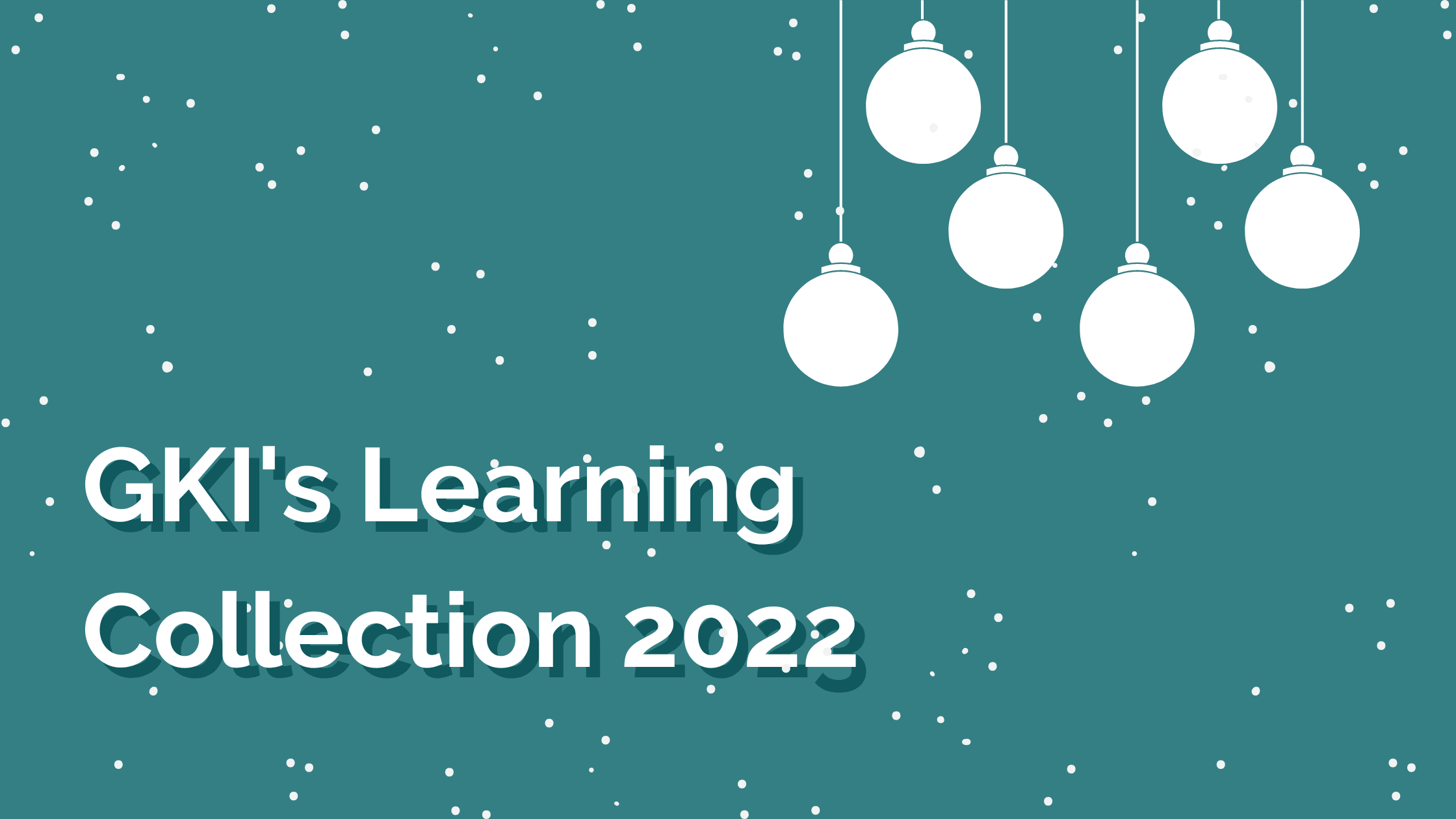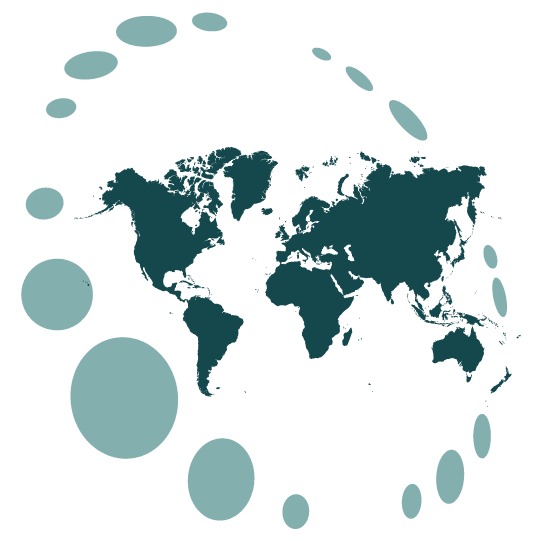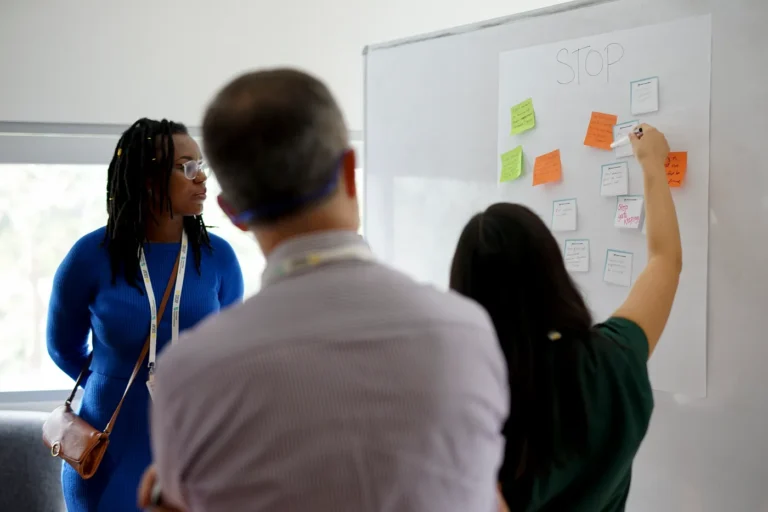Another Year of Learning: GKI’s 2022 Learning Collection
GKI values curiosity–we celebrate exploration and create opportunities to learn from one another. Before our team goes on holiday, we took the time to share things we read or listened to throughout 2022 that challenged our thinking. Take a look at some of the interesting and inspiring books and articles our team has been reading lately. Let us know what’s challenged your thinking and what you’ll be adding to your list for 2023.
“I love listening to different podcasts while on my Hot Girl Walks, and one I listen to often is the Ideo podcast called Creative Confidence. One of the ones that was most interesting this year was about inclusive design. There’s been a lot of criticism of design thinking that it just promotes white supremacy, but all of our systems are embedded in white supremacy so if you’re not consciously being anti-racist, then anything is a tool of white supremacy. We have to be anti-racist within the tools of design thinking, but often the advice on *how* simply boils down to some version of ‘don’t be racist.’ It’s almost 2023, that’s so not good enough! This podcast and its blog post describe, vividly, what inclusive mindsets look like, along with tactical tools and practical tips to do better. I’m integrating these tools into our design sprints and I hope we see more thought leadership on this topic in 2023.” – Whitney Pyles Adams, Senior Innovation Advisor
Power, for All by Julie Battilana and Tiziana Casciaro and “Should You Agitate, Innovate, or Orchestrate?” by Julie Battilana and Marissa Kimsey in the Stanford Social Innovation Review
“I went to the SSIR conference in March and one of the plenary sessions was led by the authors of this book. What I liked is that while they go into the academic theory of power and what that means for how power is exercised, they also break it down into practical terms of how individuals and organizations wield power – emphasizing that it is something that everyone has access to. There are different ways to wield power–you can be an agitator (raising awareness for where issues are), an innovator (thinking of new ways the world could look), or an orchestrator (how do we make sure action actually happens). Especially when you look at the history of social movements – it takes all of these roles. We need all kinds of people to advance change.” – Megan McGlynn Scanlon, Chief Operating Officer
The Inner Development Goals Framework, Theory U, and The Power of Presence by Peter Senge
“One of the things that’s really inspired me is the ramping up of the initiative, Inner Development Goals. This initiative recognizes, I believe rightly, that if we want to achieve the Sustainable Development Goals (SDGs) globally we have to develop some inner capacities and resilience as humans, leaders, and individuals. It’s a framework for the world to think about how we develop ourselves to work with one another as a community of humans interacting to achieve shared goals. But how can we begin to build towards the inner development goals and what practices can help as individual practitioners and leaders. The first resource I wanted to share for that is called The Power of Presence by Peter Senge. This book is designed around reflecting on what does it mean to do what is called presencing–it’s the idea of an active, action-oriented learning and mindset of observing and deeply reflecting on what we’re learning in the world. It makes you take a step back and think about how we approach our world and what we observe in it from a very inter-connected way. Supporting this way of being, is Otto Scharmer’s Theory U – which speaks to not just the tactics about how to bring people together to discuss complex situations or challenges and determine what to do, but also about how to be. The creators of Theory U took a step back and thought about ‘How do people learn? How do organizations learn? How do systems learn? This approach allows us to practice presencing to sense and act more wisely and deeply around societal challenges, to suspend judgment and let go of past thinking to crystallize new ways of thinking. to really learn. All of these go together–from the big social goal, the thoughts and insights that you can use in your daily life, and the tools to apply it in our social change practice. – Seema Patel, Chief Executive Officer
“Funding the Future: where next?” a panel discussion from System Innovation Initiative’s Learning Festival 2022 and “Making the case for improved tracking of humanitarian research and innovation funding flows” by Ziad Issa and Jessica Camburn from the The Global Prioritisation Exercise (GPE) Policy Brief in November 2022
“In grad school, I was interested in how funding mechanisms within development organizations as a system perpetuate power balances. How do these systems empower locally-led development or bring power back to people with its roots in colonialism and imperialism? This talk as part of the System Innovation Initiative’s Learning Festival talked about the future of funding, specifically in the innovation space. While the speakers talked thematically, there just wasn’t enough time to dive deep into the nitty gritty of challenging this system. As my curiosity continued, I read Elrha’s recent GPE Funding Flows Analysis Policy Brief. They did a database overview of major actors within in the humanitarian sector. It was interesting to learn more about which countries have the power to change the conversation on how funding into humanitarian work gets funding.” – Gabby Rivera, Programs Associate
“My book recommendation is a bit in the self-help category. Essentialism, his previous book, was a book talking about where to focus your energy. It’s not just living a minimalist life. Effortless focus on, now that you’ve prioritized your life, you still have too many priorities to get to, how do you get to them. It addresses still not having enough time to do everything, so how can we make things effortless to get to those things that we’ve prioritized. From the operations and project management lens, it’s an interesting book. He shares a lot of stories and examples, and while they may not directly address international development, it’s interesting to get different perspectives about making things effortless in working together and create change.” – Alycia Ikegami, Operations Manager
Emergent Strategy by adrienne maree brown
“Brown is a social justice thought leader. I had heard her name often in the race equity spaces I’m in, so I thought it was high time I read one of her books. I picked up this book right before starting with GKI because it’s so related to systems change and transformation. Being an organization that focuses on that, I thought it was very relevant–not just to the work, but also personally. One of the things I liked the most about it was how she integrates nature into the book. We’ve seen this a lot in systems innovation, the relation between systems change, network, and nature. I really appreciated some of those visual aspects. One thing that spoke to me the most in her book was about relationships, and a quote that I wrote down early on was ‘shift from mile wide, inch deep to inch wide, mile deep.’ For me this was a moment of clarity–instead of doing a ton of things at once, focus where you want to grow. The other piece of her work that resonated with me was that even though we all live within a certain system, it doesn’t mean there aren’t other ways of living. There are unknown possibilities and ways we can start to live into those dreams in smaller ways, and eventually they may cascade.” – Natalia Oyola-Sepulveda
Let us know what you’re reading and listening to, maybe you’ll see it on the list next year!







